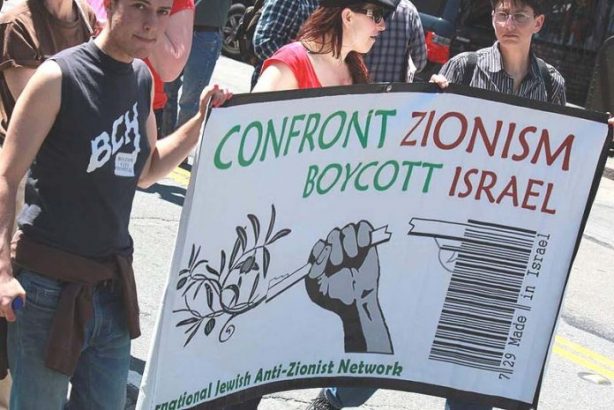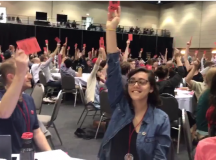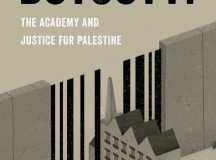Kenneth Waltzer is the executive director of the Academic Engagement Network, a national US faculty organisation committed to countering Boycott, Divestment and Sanctions (BDS). In this survey of BDS activity on US campuses he argues that, where BDS has a following, Jewish students are increasingly being consigned to a place of insult and derision, barred from progressive causes, and labelled oppressors. Those who come to their aid get similar treatment. BDS is morphing into an attack on the equal rights of Jewish students to associate freely with others on campus, to shape their own organisations and goals, to express their religious and cultural identity and to observe their heritage free from coercion by others.
During the fall semester, when little was happening on the anti-Israel Hard Left on American campuses, we could have been forgiven for thinking that perhaps the Boycott, Divestment and Sanctions (BDS) movement had slowed. But as the year continued, coinciding with Israel’s 70th anniversary, the pace of BDS efforts increased and included something relatively new: efforts to mark off, isolate, and ghettoise Jews supporting Israel on campuses, while characterising Jews in ways that are deeply worrying.
BDS on Campus
Overall, the BDS movement generated some 22 campaigns on American campuses in 2017-18, two more than it did in 2016-17. This number was down from the immediate post-Gaza incursion peak years when BDS forces mounted 44 campaigns in 2014-15 and 33 during 2015-16, 77 in all. The recent period saw BDS organising 42 campaigns in two years. BDS forces claimed victory this year in 9 of the 22 campaigns it sponsored, a 41 per cent rate of success.
Late in the year, the renewed intensity of the BDS campaigns contrasted notably with the year’s beginning. If anything, campuses were still reeling from the events at Charlottesville in August 2017 and the appearance by neo-Nazis and white supremacists at the University of Virginia with swastikas, torches and disturbing signs vowing ‘Jews will not replace us’. University leaders were also preoccupied with the growing conflict over free speech involving primarily alt-Right speakers and demands for access to public fora on campuses. Richard Spencer stirred concerns by threats to sue institutions infringing on his first amendment right to speak and by actively bringing radicals to campus, threatening real violence. At the University of Florida, the governor mobilised the Florida guard.
BDS forces scored successes in November, passing divestment resolutions in several student governments; surprisingly, first at the University of Michigan (UM), where BDS had repeatedly failed until then, at Ohio State University, the University of South Florida, the University of Minnesota, New York University (NYU), George Washington University, and recently, Barnard (in a campus referendum) and the University of Oregon. Such victories were symbolic only, as university presidents and boards of trustees quickly announced they opposed BDS and would not divest university financial holdings. On the other side of the ledger, BDS was solidly defeated at the University of Maryland, Northeastern University, the University of Illinois-Urbana Champaign, the City University of New York, Earlham, Swarthmore, Case Western Reserve University, and the University of California at Santa Barbara.
At the University of Michigan, President Mark Schlissel and the Regents upheld the university’s ‘longstanding policy to shield the endowment from political pressures’. At the University of Illinois, Chancellor Robert Jones said that BDS is not compatible with university policies on academic freedom or with the values set forth in [the] Inclusive Illinois [programme]. Illinois system President Tim Killeen added: ‘We believe that actions such as those espoused by BDS would damage academic freedom and may have an intended or unintended anti-Semitic effect which we utterly condemn.’ President Sian Beilock at Barnard said there would be no action on divestment as there was no wide consensus on the issue. She also emphasised that ‘taking an institutional stand amid the complexities of the Mideast conflict would risk chilling campus discourse on a set of issues that members of our community should be able to discuss and debate freely.’ President Michael Schill at Oregon argued BDS is divisive to social community and inconsistent with the University of Oregon’s values about inclusion.
Everywhere, BDS through their on-campus allies in Students for Justice in Palestine (SJP) utilised surreptitious methods, including stealth infiltration of student governments, hasty submission of resolutions with limited time to counter, late night meetings running to the wee hours of mornings, secret ballots meant to avoid accountability by student representatives, and other irregular procedures. Most undemocratic in orientation, BDS campaigns sought to get a small percentage of student votes amidst broad non-voting by students sufficient to brand all students on campus as BDS supporters.
I am executive director of the Academic Engagement Network (AEN), a national faculty organisation committed to countering BDS, and our members were active in each of these episodes, penning faculty-originated petitions, letters, and op-eds, engaging in efforts to mentor students, and offering strategic advice to university leaders. Professor Jeffrey Herf, Distinguished University Professor, led the successful faculty effort at the University of Maryland. The Jubilee Professor of the Arts and Sciences Cary Nelson led the winning effort at Illinois-Urbana-Champaign.
The escalation of BDS campaigns, their successes and their irregularities, posed an ongoing challenge. At Michigan, the AEN faculty spokesperson, Professor Victor Lieberman, the Raul Wallenberg Distinguished Professor of History who teaches Israel/Palestine history, was denied the right to speak to the student government, silenced by those desiring that the resolution not be deliberated fully. The final meeting lasted eight hours, shaped by censorship and silencing. The vote at 3am gave 23 to divestment, 17 against, and 5 abstentions.
From Intersectionality to Exclusion
The campaigns and their frequent undemocratic methods are not the worst of it. This year the BDS movement’s allied student organisation, SJP, embraced a new tactic that seeks to deepen divisions on campus and block Jewish participation from progressive alliances committed to social justice causes. If at Charlottesville neo-Nazis carried signs avowing ‘Jews will not replace us,’ progressive students in SJP and in other allied groups seemed now to say: ‘Jews will have no place among us.’
SJP strategy was to build alliances of progressive groups and minority (racial, religious, and gender) groups on each campus and, in the context of intellectual currents, emphasise ‘intersectionality’ (an approach to campaigning highlighting the linkages among all oppressions), identity politics, and the mobilisation of multicultural coalitions for BDS goals. This meant excluding Jewish students presumed to support Israel and Jewish institutions supporting Israel, such as Hillel. Jews were increasingly marginalised and set apart.
A template of left campus identity politics is being layered over ethnic group divisions and Middle East politics. Considerations of intersectionality and the inclusion of minority perspectives are becoming more important in some places than the facts of the Israel-Palestinian conflict. According to the new tactic, Jews were now automatically to be excluded from campaigning work with other progressive groups in popular causes; they were thought of as ‘privileged’ or ‘white,’ and therefore as ineligible for membership in such coalitions. Of Jews directly, it was said by SJP and others that they are a group that does not face and never have faced oppression like peoples of color (an astounding act of erasure and revision). Jews, it is repeated on campus, are powerful and wield great influence. Jewish students were subjected to political litmus tests before permitted entry to progressive coalitions. ‘Good Jews,’ those aloof from Israel, could participate; others, ‘bad Jews,’ Israel supporters, were to be separated and shunned.
As a noteworthy example, the resolution for divestment introduced at the University of Michigan explicitly acknowledged such identity politics and insisted on the necessity to assist Palestinian students to be heard and feel included in the multicultural mix. This was critical in shaping the vote.
AND WHEREAS, in its Diversity, Equity, and Inclusion (DEI) plan, the University continually expresses its commitment to efforts of equity and inclusion that provide underrepresented students an environment ‘where every individual feels a sense of belonging and inclusion’;
AND WHEREAS, Palestinian students, as a minority group on campus, receive not the University’s full support, nor the benefits of its plan to foster a more inclusive climate, so long as a proportion of the endowment is invested by the University in companies that violate Palestinian human rights in Israel…
As the Michigan Daily reported, divestment at the UM was about giving an underrepresented group of students a platform and helping them to feel included at the university as much as protesting the human rights record abroad. Student representatives insisted that by passing the resolution they were acknowledging to Palestinian students at UM that they were indeed part of the community and should in consequence ‘feel’ included.
Deep discrimination, distraught parents
In recent weeks, several events have illustrated how – given this new emphasis – BDS initiatives now impact social relations and group life on campus. At NYU, recently, some 53 progressive student groups, led by the SJP and Jewish Voice for Peace, pledged to support the boycott of Israel academics and additionally pledged to boycott Jewish pro-Israel student organisations on campus. They vowed not to associate with such groups or permit them to join in their activities. NYU President Andrew Hamilton issued a statement rejecting BDS as inconsistent with university values, but has been slow in characterising these group actions at NYU as deeply discriminatory.
When I recently visited at the University of California at Davis, a distraught grandfather told me about his grandson’s experience at Cal Polytech. A student group there was demanding additional funding for all student organisations except Jewish organisations that it designated as pro-Zionist. The group demanded that university funding be removed from such Jewish organisations.
Finally, at the State University of New York at Stony Brook, SJP students demanded that the campus Hillel be replaced by a ‘proper Jewish organisation’. Such an organisation should not be a Zionist one; it should focus on observing the Sabbath and holidays but not offer support to a Jewish homeland. These students also characterised Jews as ‘oppressors’. When the chaplain for the Muslim Students Association, Saana Nadim, called on the SJP students to abandon their ‘agenda of hate and alienation,’ and in a brave interfaith statement forthrightly defended Hillel, SJP attacked the Muslim chaplain, accusing her of working with Zionists.
The pattern is showing up increasingly frequently: where BDS and SJP adherents build strength and mobilise broadly on campuses, creating working inter-ethnic and minority alliances, pro-Israel Jewish students and those presumed to be pro-Israel are pushed aside, treated and referred to as pariahs, and excluded from progressive causes. Those who speak out on their behalf earn similar treatment. Where this occurs, BDS morphs from being a boycott movement opposed to Israeli and American scholars and Israel’s legitimacy into an attack also on the equal rights of Jewish students to associate freely with others on campus, to choose their own goals and causes, and to express their identity without being coerced by others. In the year ahead, the Academic Engagement Network must focus on mentoring such students to assist them to fight such exclusion.





































One silver lining is that Jewish students are being denied involvement in ‘progressive ‘ causes. Maybe it will give them a chance to see ‘progressivism’ for what it is: totalitarianism.
This is another deeply disturbing development in the destruction of academic freedom on U.S. campuses. It seems to me not only outrageous but not really not understandable that they are getting away this. Why is there not a more general principled wide- spread objection to the tactics of the BDS people?
How is it that universities in US can vote to boycott Israel when the US has required that all US companies not be associated with any company in or outside of US that support a boycott not embraced by US. Would not a boycott resolution from a university directly lead to it’s non function? – because I assume that the students will need housing, all will need food, and the university itself will need funding in some way to function. – all of this will have to be something you get directly or indirectly from a US company – which after the BDS resolution must be banned from doing any business with the university…
Ofc. all this BDS activity will be good for something. It will be very good for Israel, because the best and most obvious solution for those who are hunted by BDS – the jews, will be to make aliyah to Israel. This will be great for Israel, as it is well known that the jews are generally the smartest people – and Israel will this way harvest the best heads from US – leaving US lacking of skill and knowledge – making the universities falling behind on their job on truly educating the students in skills that matter (that is for constructive knowledge, not how to make bombs and sad lives for anyone afflicted with BDS)… by the way – are you sure that the real content of BDS was not Brain-Dead-Stupidity? – they just found something else to call it later on, that matched the letters…
Thank you Academic Engagement Network for this thorough summary and for doing important, good, work.
I think an underlying cause of our difficulties here is the lack of knowledge of relatively young students about the Middle East and its history, how Jews were driven out of Arab lands, how Arabs forbid Jew from living in or even visiting Jerusalem when they were in charge, how they rejected all compromises. The uniformed young people in BDS are not necessarily bad and their sympathy for what they see as oppressed people can be admirable, so I think it best to approach them with shared progressive values and not right wing tropes as are used to attack all liberals, Obama etc, – that won’t work.
As worthy as your efforts are, I believe that they are only reactionary, and therefore will fail.
What Jews need is a proactive campaign that puts Jews back in the centre, legitimises Israel and exposes the assault on truth, American values, free speech and individual rights of the SJP and BDS movements.
How would such a campaign proceed? Here are my suggestions, but they could be changed depending on local circumstances:
1) Encourage Jewish males to wear kippot everywhere, with the US and Israeli flags intertwined. Underneath could be the words: “democracies, allies and friends”. This will help overcome ignorance of Jews, resulting in less stereotyping and a disconnect between the oppressor claims and the reality of decent human beings. The kippot should be mass-produced and distributed with hair pins.
2) Those wearing kippot should be encouraged to wear them proudly, but at the same time recognise that they are ambassadors of the Jewish people, and should be especially nice to others – respectful, enabling, polite, friendly, etc.
3) Create sticky posters showing the Israeli and Palestinian reactions to the twin towers attacks – sweets handed out vs a memorial service. Underneath could be the line “Who are our true friends?”. Have these posters distributed to Jewish students to place on their bags, lockers and other places on campus.
4) Show a pride march in Israel contrasted with a homosexual beaten up and incarcerated in a cell in the West Bank or Gaza, with the line “Israel – a champion of gay rights” – again put this in a poster for distribution.
5) A similar poster could be used to contrast women’s freedom in Israel vs honour killings and FGM in the PA and Gaza lands.
This campaign could then progress into many other areas as the need arises, to counter the silencing and exclusion of Jews on campus.
It is not necessary to deny the tough situation that the Palestinian “Refugees” find themselves in. It should be helpful to document that the oppressors of these people are neither Jews nor Israelis. The oppressors of the Palestinians are the Arab leaders, who willfully force these people to stay in UN poverty camps.
The Arab League passed (again) a resolution that the people in the camps must NOT be allowed to become citizens of the countries they were born in. All the Arab states discriminate explicitly against Palestinians by law.
See, for example, this article by Palestinian writer It is not necessary to deny the tough situation that the Palestinian “Refugees” find themselves in. It should be helpful to document that the oppressors of these people are neither Jews nor Israelis. The oppressors of the Palestinians are the Arab leaders, who willfully force these people to stay in UN poverty camps.
The Arab League passed (again) a resolution that the people in the camps must NOT be allowed to become citizens of the countries they were born in. All the Arab states discriminate explicitly against Palestinians by law.
See, for example, this article by Palestinian Khaled Abu Toameh.
This is the sort of information that the “Swing voters” will respond to. The Arab students probably know all about this.
It is no doubt worthwhile to also describe the horrors of Palestinian life in Yarmouk UN camp in Syria. And the utter lack of focus on this by the Palestinian so-called leaders.
Correction:
I typed in another comment that “All the Arab states discriminate…”.
It should have been: “All the Arab states but Jordan discriminate…”.